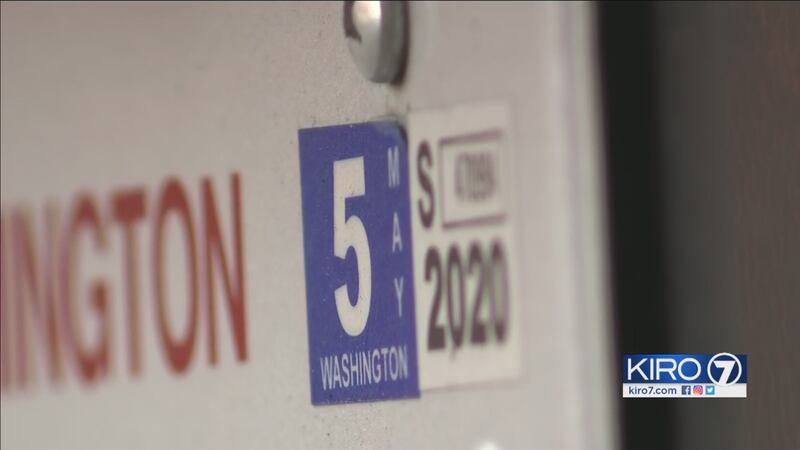SEATTLE — UPDATE 12-4-19: The state Supreme Court on Wednesday ruled that a voter-approved $30 car tab measure will remain on hold while a legal fight over the initiative's constitutionality plays out.
The Washington State Attorney General's Office filed an emergency motion Monday saying Washington voters’ wishes were being “stymied” by a King County Superior Court judge’s decision to stop Initiative 976 from taking effect.
On Tuesday, initiative sponsor Tim Eyman and his allies filed their own request to vacate the lower court’s injunction and move the case to the state Supreme Court. That was dismissed by the Supreme Court Wednesday.
Voters last month approved I-976, the statewide measure that calls for lowering many vehicle registration fees to $30, rolling back car-tab taxes that fund Sound Transit and doing away with local car-tab fees. Much of the measure was set to take effect Dec. 5.
Seattle, King County, the Garfield County Transportation Authority and a handful of other groups sued, saying the measure is unconstitutional.
King County Superior Court Judge Marshall Ferguson sided with the groups last week, temporarily blocking I-976 from taking effect but not yet ruling on the initiative itself.
At issue in the case has been the ballot title voters saw for I-976, written by the Attorney General’s Office. That language said I-976 would repeal, reduce or remove authority for certain vehicle taxes and limit annual car-tab fees to $30 "except voter-approved charges." The initiative itself said only charges approved by voters after the measure took effect were exempted. The measure also would repeal cities’ authority to charge car-tab taxes regardless of whether they are voter-approved.
Seattle and others argue the title was misleading. The state counters that ballot titles can be general as long as they include enough information to prompt voters to look to the text of the initiative itself for details.
Seattle City Attorney Pete Holmes said in a statement that “the court's order rightly maintains the status quo while we have the opportunity to fully present our arguments that this harmful, misleading measure should not take effect.”
Eyman in an email to supporters railed against Attorney General Bob Ferguson, saying Ferguson sabotaged the measure by failing to defend it effectively and by not filing additional motions.
Eyman also faces a long-running campaign finance lawsuit from Ferguson's office.
UPDATE, 11-27-19: The court has granted a preliminary injunction putting a hold on the $30 car tab initiative I-976.
In granting the injunction, King County Superior Court Judge Marshall Ferguson wrote that the State of Washington is “enjoined from implementing or enforcing 1-976.”
The judge wrote that the state “shall continue to collect all fees, taxes, and other charges that would be subject to or impacted by 1-976 were it not stayed, and shall distribute those funds to local municipalities and political subdivisions as appropriate pursuant to existing laws, regulations, contracts, obligations, policies, and procedures.”
Ferguson ruled that challengers “are likely to prevail” on their constitutional challenge that the l-976 ballot title was misleading.
Read the full text of the judge's ruling here.
I-976 sponsor Tim Eyman was angry Tuesday after what he considered a lackluster defense by the state Attorney General's office.
Original story:
A King County judge said Tuesday he has concerns that the ballot language of Tim Eyman’s $30 car tab measure was misleading, but he did not immediately say whether he will block it from taking effect while a legal challenge proceeds.
Washington voters approved Initiative 976 earlier this month. It caps most taxes paid through annual vehicle registration at $30 and largely restricts the authority of state and local governments to add new taxes and fees.
Lawyers for cities and counties across the state are asking Superior Court Judge Marshall Ferguson to block it, saying that it was misleading, violates the state Constitution in several ways and would decimate revenues they need to pay for roads, bridges and transit. It would cost the state and local governments more than $4 billion in revenue over the next six years, according to the state Office of Financial Management.
Click here for a list of projects the Washington Department of Transportation says are now postponed because of $30 dollar car tab initiative.
The plaintiffs have noted that the ballot summary said I-976 would “limit annual motor-vehicle-license fees to $30, except voter-approved charges.” That suggested to voters that locally approved measures, such as additional license fees passed by Seattle voters to pay for additional bus service and voters’ agreement to fund Seattle-area Sound Transit light rail projects, would survive, they said.
As the full text of the measure shows, however, only fees approved by voters in the future would be allowed, and the authority of local jurisdictions to seek such measures to begin with would also be curtailed.
“That kind of goes to the heart of the potential deception the court is concerned about here: Where the ballot title strongly implies one thing, the initiative text specifies almost the exact opposite,” the judge said.
Ferguson said he planned to rule by Wednesday. A finding that the ballot title was misleading would invalidate the initiative entirely.
Alan Copsey, a lawyer for the state, disagreed that the language was deceptive. He argued that measure descriptions on the ballot are limited to 30 words, so not every effect can be described.
The ballot language said the measure would “repeal, reduce, or remove authority to impose certain vehicle taxes and fees,” and that should have put voters on notice that they needed to read the initiative’s full language if they wanted to know what it did, he said.
The initiative’s sponsor, Eyman, is a longtime antitax initiative promoter who recently announced a run for governor. His $30 car tab initiative first passed 20 years ago. It was struck down in court before being enacted by lawmakers. The fees have crept up as lawmakers allowed them and voters in some places approved them.
Eyman also promoted the initiative as a way to undo a car-tab fee hike collected by Sound Transit in the Puget Sound region. The agency uses a method of vehicle valuation that inflates some car values. Voters approved the increase as part of a light-rail expansion package in 2016 for King, Snohomish and Pierce counties. Some drivers experienced car tab sticker shock after the measure was approved and costs soared. One lawsuit over the valuations is before the state's high court.
With I-976's passage, Sound Transit stands to lose about $328 million a year, or about 11% of its annual revenue, according to the state analysis. The agency said it could lose about $13 billion more over 20 years because of higher borrowing costs and possible light rail project delays.
In Seattle, an $80 car tab fee pays for, among other things, bus and light-rail passes for students and residents who live in public housing. The city said it would have to cut 110,000 hours in bus service due to I-976. Across the state, Garfield County said it would have to cut by half the transportation services it provides to help seniors and disabled people get to the grocery store, the doctor and other appointments.
The governments and organizations challenging the measure, including the Association of Washington Cities, said it violates the state Constitution in myriad ways, including by covering multiple subjects in a single measure.
For example, they said, it purports to reduce car tabs to $30 while also requiring Sound Transit to retire or refinance its outstanding bonds — something that voters would have no idea about from reading the ballot summary.
Copsey argued that the initiative’s various provisions were all properly related to its general subject: “motor vehicle taxes and fees.” Further, he said, governments can choose to maintain transportation funding by cutting in other areas.
“What the plaintiffs have brought to the court is a policy disagreement that’s clothed in constitutional language,” Copsey said. “The plaintiffs ask the court to overturn the will of the voters.”
The attorney general’s office is typically charged with defending the constitutionality of state laws. Copsey is a deputy solicitor general in the office of Attorney General Bob Ferguson.
Eyman has asked to have the office recused from the case because Ferguson has sued him over campaign finance issues. Eyman has twice been held in contempt of court for refusing to cooperate with court rules.
After Tuesday’s hearing, he criticized Copsey, accusing him of deliberately sabotaging I-976 by not making all the arguments Eyman wanted him to make. In a heated exchange, state Solicitor General Noah Purcell told Eyman he was wrong — and that he should be thanking Copsey for his efforts to save the measure.
Tim Eyman angry at I-976 defense
An angry Tim Eyman excoriated the state lawyers defending his $30 car tab initiative after a court hearing where opponents sought a preliminary injunction.
Eyman was angry that the Attorney General’s legal team didn't agree with his position on when Sound Transit taxes must stop. Eyman says that's firmly on Dec. 5, the day the initiative takes effect.
“You're already sabotaging the initiative,” Eyman yelled at Solicitor General Noah Purcell. “I drafted the initiative, sir. I would know exactly what the initiative does!”
King County, Garfield County, Seattle and others are defending the car tab taxes. They want a preliminary injunction to stop Initiative 976 before it eliminates the transit benefit taxes passed by voters.
In Seattle alone, they say those taxes pay for 110,000 hours of bus service and 85 Metro Transit jobs.
“What we've got here is a local vote for a specific period of time that is overturned by the entire state and that I would argue is a constitutional violation,” Assistant City Attorney Carolyn Boies told Superior Court Judge Marshall Ferguson.
Deputy Solicitor General Alan Copsey pointed out that Seattle has a reserve it could use to continue bus service for a time after I-976 takes effect: “They have $20 million already plus potentially other available money so that that the reduction in service would not necessarily have to occur in March."
At the end of the hearing, Eyman stood to address Ferguson without permission.
Solicitor General Purcell said that, "Tim Eyman's conduct in court today was wildly inappropriate. It will have only one result -- hurt our chances of successfully defending the people's initiative."
More news from KIRO 7
- Stolen dog found at officer-involved shooting scene
- Lawsuit filed after Seattle nursing home hidden camera rape arrest
- 'Thunder hail' storm a drag for drivers but not for police on Pacific Raceway
- Man fatally shot in Parkland
- Do you have an investigative story tip? Send us an email at investigate@kiro7.com
KIRO








